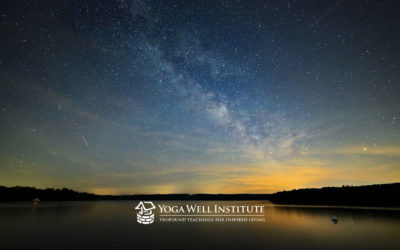Blog – Wisdom For The Journey
Yoga Philosophy: Why are the Ancient Texts of Yoga Important?
YOGA'S FOUNDATIONAL TEXTS The essential principles of Yoga as a practice, and a way of life, can be found in these three main texts: The Bhagavad Gita, The Yoga Sutras of Patanjali, and The Hatha Yoga Paradipika. The latter two especially provide practical teachings...
An Introduction to the Yogasūtra
A Guide for Everyday Life What is Patañjali’s Yogasūtra? Patañjali’s Yogasūtra is one of the most important texts on the practice of Yoga. Think of it as an instruction manual for living a satisfying and meaningful life. Patañjali’s Yogasūtra presents the principles...
6 Benefits of Āyurveda
There are numerous benefits to Āyurveda, an ancient health science from India, that focuses on how to bring mind, body, and spirit into balance. Āyurvedic medicine supports each individual to come into balance as well as to maintain that balance over a lifetime....
Yoga and Religion: The Sweet Irony of Yoga
When I first embraced the Yoga Well community, as a student in the 2020-2021 DYY Program, I was somewhat adrift spiritually. A BIT OF BACKGROUND The foundation from which I let myself lift into the nebulous was a lifelong love for the Episcopal Church with its...
What are the Benefits of Yoga Therapy?
When I tell people that I work as a Yoga Therapist, I often have to explain what that means. People know what Yoga is, but Yoga as a healing modality is something they want to know more about. They ask, “What is Yoga Therapy?” Essentially, Yoga Therapy uses the tools...
The Yogasūtras of Patanjali: What Yoga’s About
How to Practice Yoga on the Mat & in Everyday Life. WHAT IS YOGA? Yoga is often thought of as a physical exercise that happens in a gym or on a mat. This idea of Yoga misses a huge part of what Yoga is about. Yoga actually describes a way of being that occurs both...
Your Breath Bridges Internal and External Worlds
Guest blog by Carrie Heeter, PhD, Professor Emeritus, Michigan State University When you do a personal daily yoga practice you are alone. Your focus is internal. The outside world feels distant. But the outside world flows into and back out of you with every breath....
Your Breath Operates in Conscious and Unconscious Realms
Guest blog by Carrie Heeter, PhD, Professor Emeritus, Michigan State University | Conscious and unconscious breathing are controlled by separate brain pathways. Breathing that happens without any conscious effort is called metabolic breathing. Metabolic breathing does...
Your Breath is Hidden and Observable
Guest blog by Carrie Heeter, PhD, Professor Emeritus, Michigan State University | Breathing operates in hidden and observable realms of your human system. Most aspects of respiration are hidden from your conscious mind. Paying attention to the parts of your breath...
Mantra as a Support for Focusing the Mind
Mantra is commonly thought of as a special word or phrase repeated during, or as a support in, meditation. However, it is important to know that simply repeating the mantra, and hoping for profound change is insufficient. For a powerful impact, we need to visualize...
Yoga for Clarity
Recently, in our Application of Meditation class, our discussion touched on the idea of clarity and how it arises. And I was reminded again that clarity is not something we do. Clarity is a result, not an action. What we do is Yoga. And the result of Yoga is clarity....
Ujjāyī as a Foundation for Yoga
WHAT IS UJJĀYĪ? The first function of Ujjāyī One of the most common breathing techniques in the practice of Yoga is called ujjāyī. This technique has two main functions. The first is to make the breath tangible, to make it something that you can perceive. During much...
Yoga helps develop a partnership between body and mind
Guest blog by Carrie Heeter, PhD, Professor Emeritus, Michigan State University | Your body is always nudging you to do things—usually without you realizing it. Paying attention to bodily sensations can tell you about yourself and your world. Your mind and body can...
Learning How to Think
Have you ever thought about how you think? About the tone and content of your inner dialogue? About the source of your “shoulds” and expectations? When I was in my 20’s, I really hadn’t. I had a job nannying two wonderful little girls in a family where kids were...
Do Yoga Badly at Least Once a Week
Guest blog by Carrie Heeter, PhD, Professor Emeritus, Michigan State University | The first time you do a movement is an experiment. Repeating the movement becomes a pattern. Patterns solidify into structure. So how is Yoga an experiment? And what do patterns have to...
Why You Should Read the Yogasūtras
Yoga in the West has an abundance of techniques available on the internet, or at your neighborhood Yoga studio, to anyone who wants to try them. The ‘how’ of doing physical postures is everywhere. What’s missing in mainstream Yoga is the ‘why.’ There are actually...
Compassion Meditation Improves Seven Aspects of Psychological Distress
Guest blog by Carrie Heeter, PhD, Professor Emeritus, Michigan State University Scientists found that doing an ancient Buddhist loving-kindness meditation five days per week for three months resulted in improvements in seven aspects of psychological distress. What...
Yoga Bodies, Yoga Minds
Written by the Executive Director of the Yoga Well Institute, Chase Bossart, this article first appeared in the “International Journal of Yoga Therapists (IJYT). The violin is a popular instrument in South India just as it is in the U.S. However, the way it is played...
The Yogasūtras Explained: Translating Patañjali’s Yogasūtras 1.1 & 1.2
Current scholarship on Patañjali’s Yogasūtra holds that it was composed around 400 CE in India, in Sanskrit, in a style known as sūtra. This means the text, which is the core presentation of Yoga as a path of living or as a practice in life, uses as few words as...
Yoga Well Institute Philosophy Classes Blend Indiana Jones with Genealogy
Guest blog by Carrie Heeter, PhD, Professor Emeritus, Michigan State University | Yoga Philosophy in Daily Life: Treasure Hunters In Indiana Jones movies actor Harrison Ford plays Dr. Jones—an archeologist and part-time anthropologist searching for ancient treasure. ...



















